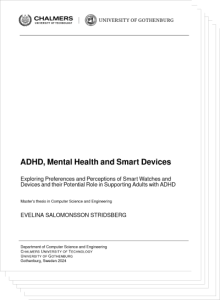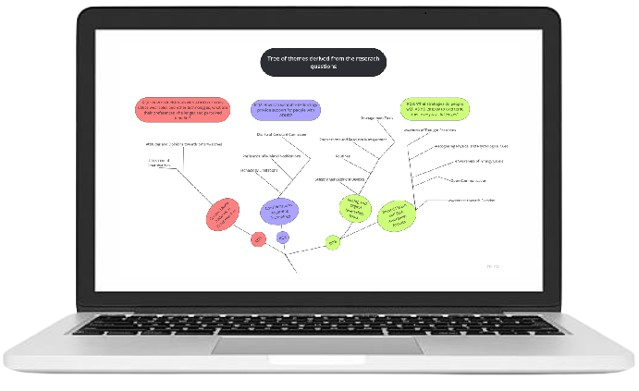2024
Master Thesis
Short title: ADHD, Mental Health and Smart Devices.
Long title: Exploring Preferences and Perceptions of Smart Watches and Devices and their Potential Role in Supporting Adults with ADHD
ROLE: Researcher, Project Manager
PROJECT DURATION: 6 Months (30 hp)

Project Overview
This thesis explored how wearable technology, specifically smartwatches, can support adults with ADHD in managing their daily challenges. ADHD, characterized by inattention, hyperactivity, and impulsivity, often impacts executive functioning and well-being.
Through qualitative research methods, the study examined participants’ current use of wearables, their preferences, challenges, and perceived benefits. It also investigated strategies employed by individuals with ADHD to manage daily tasks and how smartwatches could integrate these strategies.
The findings revealed that while smartwatches were not commonly used, participants relied on a mix of analog and digital tools to address their challenges. Key recommendations focused on tailoring smartwatch features—such as customizable notifications, timers, and voice-recorded notes—to better align with user needs. Additionally, the study emphasized the importance of education, personalized setup assistance, and integration with healthcare systems to promote adoption and effective use.

My Roles and Contributions
As the sole researcher and project manager, I was responsible for:
Research Design: Developed the study’s structure, research questions, and goals.
Participant Recruitment and Coordination: Identified and engaged diverse participants to ensure meaningful insights.
Data Collection: Conducted semi-structured interviews to gather rich qualitative data.
Qualitative Analysis: Performed thematic analysis using NVivo and Miro to identify patterns and themes.
Reporting: Translated findings into actionable recommendations and compiled them into a comprehensive thesis.
Iterative Reflection: Continuously refined methods and insights to ensure alignment with the project’s objectives.
Design Process

01. Define
- Developed a problem statement focusing on how wearable technology could address ADHD-related challenges.
- Identified goals for understanding user preferences, challenges, and strategies.
02. The Study (Research & Data Collection)
- Semi-Structured Interviews: Conducted in-depth interviews to explore participants’ experiences with smartwatches and other tools.
- Data Gathering: Employed qualitative methods to collect insights into user behaviors, preferences, and challenges.
03. Analysis (Thematic)
- Conducted thematic analysis using NVivo to identify key patterns and themes, including participants’ strategies and perceptions of wearable technology.
- Organized insights visually in Miro for further refinement and synthesis.
04. Results
- Mental Health and Self-Awareness Aspects
- Analog and Digital Tools
Recommendations
Developed recommendations for integrating smartwatch features with these strategies, including:
- Customizable notifications, timers, and reminder
- Voice-recorded notes for quick and easy access.
Additionally, proposed recommendations for education and guidance initiatives from healthcare and educational systems to promote the adoption of these technologies.
Key Insights and Impact
The research contributed to a deeper understanding of how wearable technology can support individuals with ADHD. Key outcomes included:
- Recommendations for Wearable Features: Tailored features like customizable alarms and voice-recorded notes to address ADHD-related challenges.
- Integration with Support Systems: Highlighted the role of education and guidance from healthcare and educational institutions to encourage adoption.
- Future Research Directions: Provided actionable insights for further exploration of ADHD-supportive wearables.
Challenges and Solutions
Sampling Diversity:
Recruiting a diverse participant group was challenging, as convenience and purposeful sampling limited representation. Being aware of the recruitment strategy and refining interview questions helped capture a range of perspectives.
Balancing Bias:
Avoiding bias during analysis required integrating psychological and behavioral insights to ground findings in evidence while ensuring participant perspectives were authentically represented.
Iterative Data Refinement:
One challenge I faced during data collection was the inability to implement an iterative data analysis process. Ideally, I would have analyzed the data between interviews or conducted two separate sessions with each participant, allowing for adjustments to the interview guide based on insights gained. However, due to time constraints and participant availability, this approach was not feasible. As a solution, I continued with the original interview structure, but I adapted my questioning during the interviews based on the responses I received, asking certain participants specific questions that seemed more relevant to their experiences. While this was a limitation, it still allowed me to gather valuable insights. In future projects, I would consider incorporating an iterative approach to improve data alignment and enhance the depth of analysis.
Reflection and Learnings
This project enhanced my skills in:
- Qualitative Research: Developed expertise in semi-structured interviews, thematic analysis, and participant coordination.
- User-Centered Thinking: Gained insights into how user needs and preferences drive functionality in technology design.
- Analytical Rigor: Strengthened my ability to analyze complex data sets without bias, uncovering meaningful insights grounded in evidence.
- Adaptability and Collaboration: Learned the importance of interdisciplinary perspectives and iterative refinement, which I look forward to applying in future roles.
- Passion for Healthcare Technology: Developed a deeper interest in designing technology that supports well-being.
Conclusion
Completing this thesis solidified my ability to design and execute user research projects, analyze complex data, and deliver actionable recommendations. My practical mindset, analytical skills, and problem-solving abilities have prepared me to excel in roles that bridge technology and user needs. I am excited to continue creating solutions that enhance users’ lives.

Collaboration with the University of Gothenburg
The HCI Department (Institutionen för Tillämpad Informationsteknologi - IT)
This research was conducted in collaboration with Univeristy of Gothenburg, aiming to bridge an existing knowledge gap regarding the use of wearable technology in supporting individuals with ADHD. By addressing a key question that the university had identified, the study provided valuable insights into how smartwatches and other wearables can be tailored to better assist individuals in managing their daily challenges. This partnership not only advanced the research in this area but also highlighted my ability to conduct academic research while aligning with institutional goals and priorities.